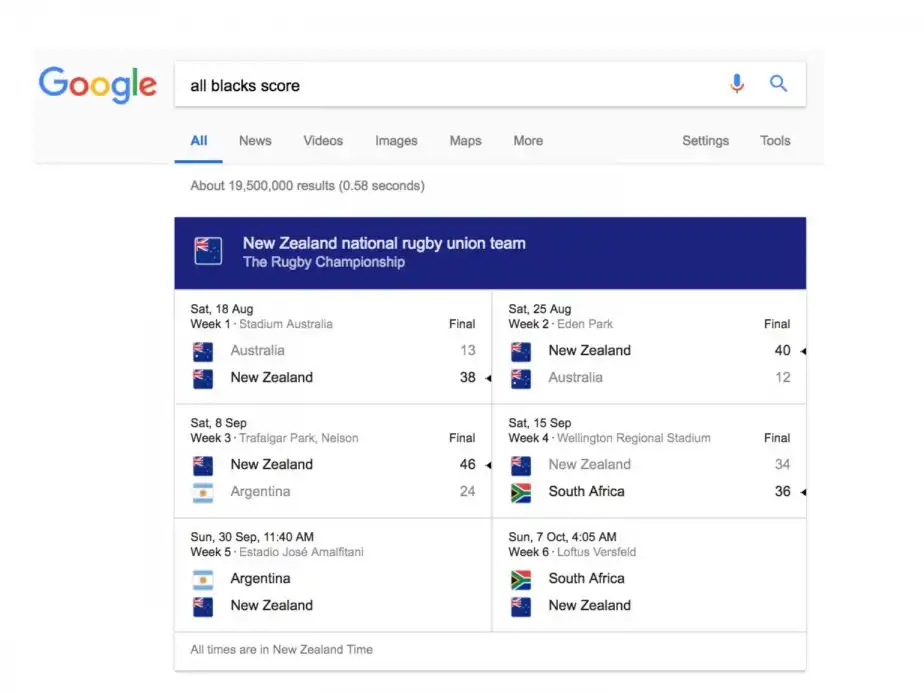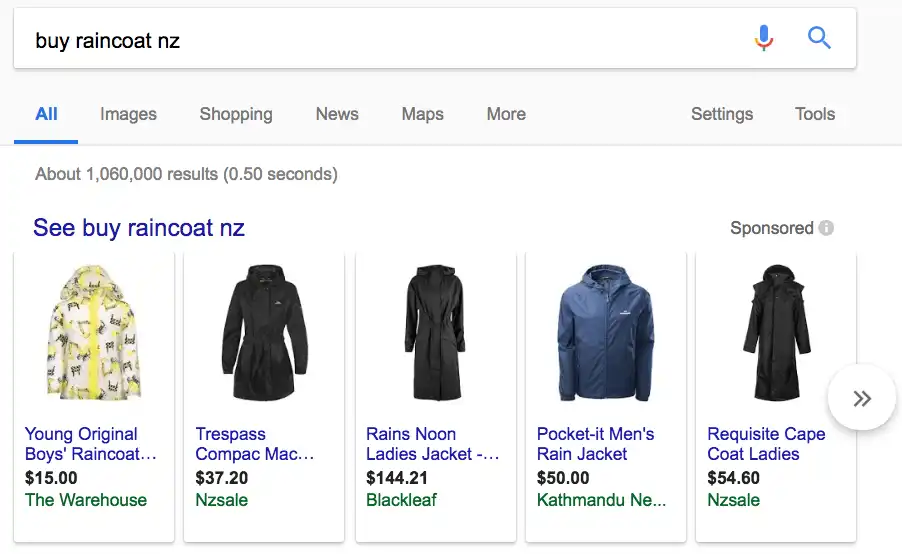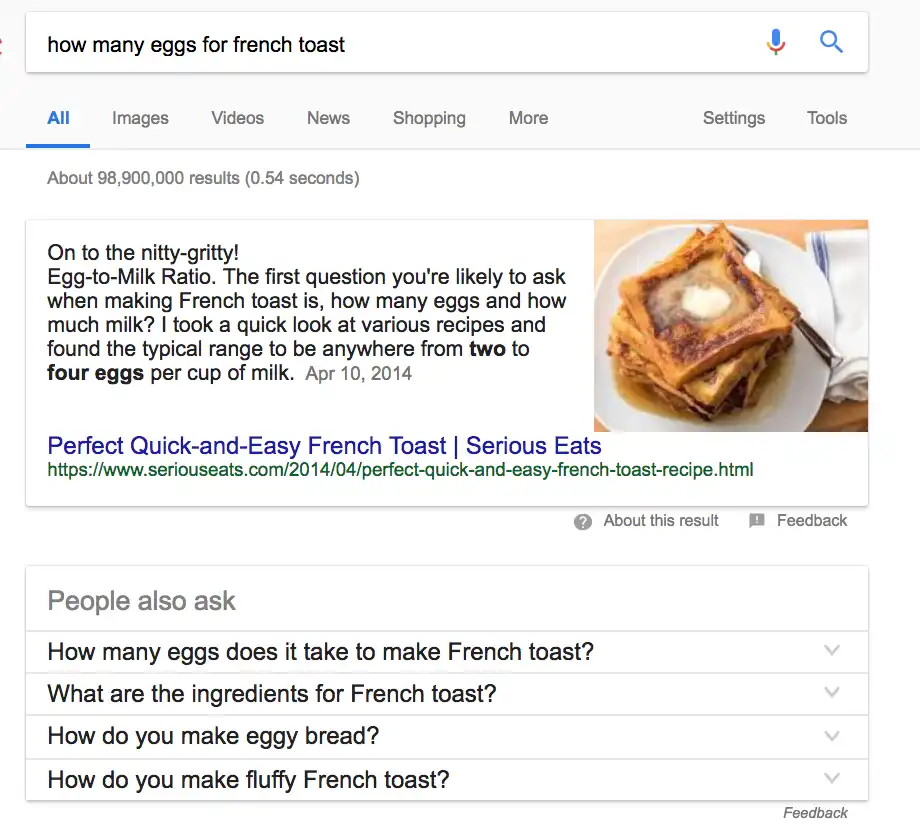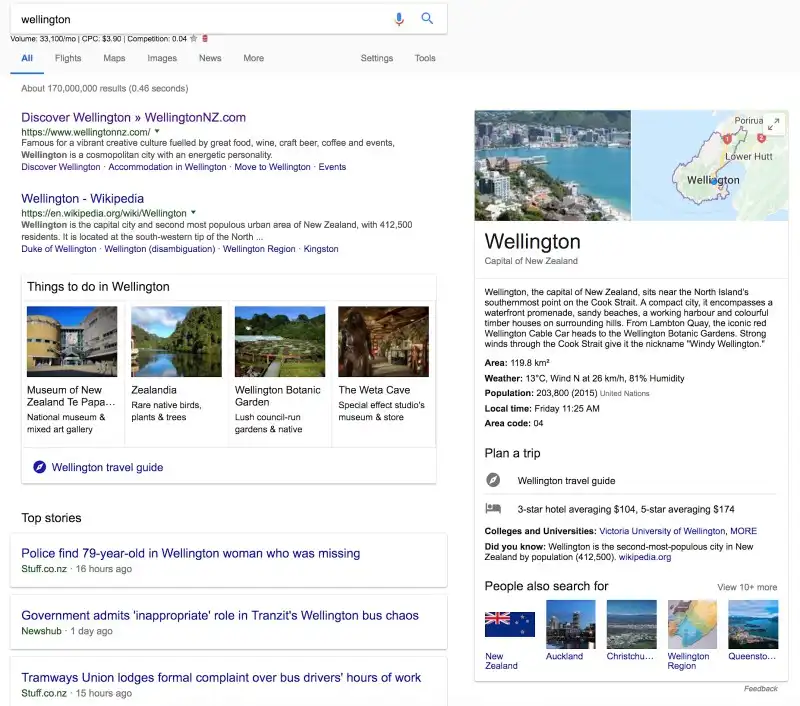
I’m often asked about ‘tricks’ and ‘hacks’ to optimise a business’ website for search. And I’m always happy to inform people that in 2018, there really aren’t any effective ‘tricks’ as such. At least ones safely future-proofed.
The truth is, to be successful in search these days you need to provide a genuinely high-quality experience for searchers. Paid and organic search. How you do this, is where the search strategist should spend their time and efforts.
Understanding Google for what it is
At its most simplified, a search engine could be described as a question and answer machine. First people “ask” search engines like Google a question in the form of a search query. Then, Google looks to provide the best “answers” in order of determined relevance and quality.
That question could be informational like flight times, dates of historical events. Google even has answers for sports scores.

Or, a search query might be directly related to shopping intent.

In many cases, people will type their ‘questions’ as exactly that - questions.

As you can see, and will have no doubt experienced, Google serves a number of different answer formats (or ‘result sets’) depending on the nature of the question. It’s much the same to asking a person question – you’d expect the answers to vary depending on what you’ve asked. “What’s the time?” has a very quick answer, whereas “Where do babies come from?” warrants a longer response (and a sit down).
Interestingly, Google’s even experimenting with results where they simply provide only one (presumably) factual answer. We’re keeping an eye on this – along with the rest of the industry.
Ask questions, get answers
Optimising is now less about technical tricks and more about putting the searcher’s needs first.
- Someone looking for guided tour times? This information is easier to read in a table.
- Someone looking for a pancake recipe? As a combination of ingredients and steps, its easiest to follow in bullets and numbered lists.
- Selling shoes? Reviews and images are important to include.
A lot of this seems like common sense, but you’d be surprised at how many websites haven’t considered the best ways to present certain information. This can hurt quality score in the case of paid search and search position in the case of organic. Spend some time getting the experience right and you’ll see long-term benefits in the form of high search visibility, traffic and conversions.
Many will be familiar with the concept and discipline of ‘User Experience’. I like to think about Organic Search Engine Optimisation (SEO) and Paid Search Engine Marketing (SEM) as being all about improving the searcher experience.
Huh, the searcher experience?
So much happens before someone arrives on your website. And in the context of search traffic – paid or organic – it's critical to consider their whole journey. From initial search, to the results they see, through to the page they land when they arrive on your site.
Does this all align with what people want?
Making sure ad copy (paid) or meta information (organic) speaks to the intent of the search query can lift the effectiveness of your search result. Reflect pre-click messaging accurately on your landing page and vice versa. This will help provide a useful ‘searcher experience’ for your audience.
What's a good searcher experience?
There’s a big source of clues when conducting SEO or SEM strategy – Google results themselves.
When you begin a search strategy, take a close look at existing results for your target keyword/theme. What sort of ad copy is showing up? Are map results prominent? Are the top organic results typically information-based sources, or are commercial websites dominating? Perhaps a mix?
When you click through to these results’ landing pages, are there particular elements that appear, such as video?

Studying results for a given keyword can inform your search strategy. They can help you create experiences on your website that take into account elements and content Google’s currently favouring.
Researching results and keywords will help you:
- achieve a good organic search position, faster,
- get higher quality score in Adwords (and consequently cheaper cost per click)
- identify gaps in the competition’s search experience that can be filled (content, meta information, ad copy).
Learning to love moving goal posts
Part of what keeps search interesting is the constant iterations search engines like Google are making. It’s important to remember these new result types, ad formats and algorithmic changes are all (well, mostly) in the name of making the searcher experience better. And I like that.
Websites that give people what they’re looking for are greatly favoured in search. That’s not to say your own brand and message aren’t important. But you’ll have a lot more success if you reflect your audience in your own website, too.
If you want to find out more about search strategy, or digital marketing and optimisation broadly, get in touch. You can also contact me directly at tom.pitchforth@springload.co.nz
Get in touch
Let’s make the things that matter, better.
Email: hello@springload.co.nz
Phone: +64 4 801 8205